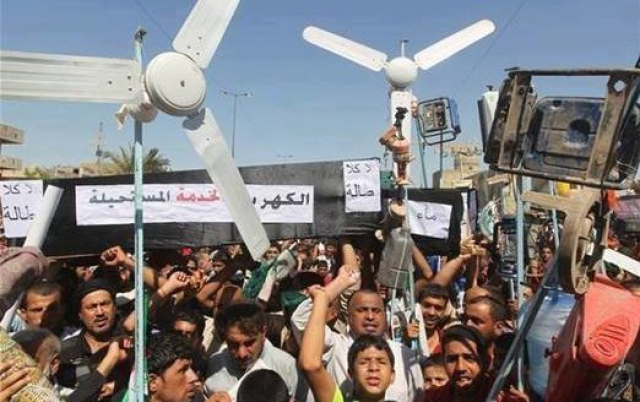Factors that have caused this problem to remain unsolved and turn into a crisis are: high cost of electricity generation and fuel purchases, fuel shortages and increased consumption due to population growth, lack of investment, weak infrastructures, network decay as oil prices fall, targeting of Iraqi energy grids by ISIS and problems related to dilapidated transportation lines, weather conditions, illegal use of electricity by many subscribers, and delay in the maintenance of power plants.
On the other hand, Iraq’s inability to pay its debts to Iran due to the continuation of US sanctions has made it difficult for Iraq to rely on Iranian gas in the future, and has created a gap between supply and demand in that country. Hence, Iraq is looking for alternative solutions to reduce its fuel costs.
In fact, Iraq is trying to make purchases from foreign countries competitive, increase gas imports, and moderate energy prices by diversifying its sources of electricity and gas imports. As for the alternative ways, the following can be referred to:
- Import of electricity from Jordan; implementation of the project has been entrusted to the American company General Electric.
- Connection to the electricity grid of the Persian Gulf Cooperation Council (PGCC) countries with two transmission lines through Kuwait.
- Signing a quadrilateral contract with the French company Total for the implementation of four projects in the field of gas and electricity.
- Projects under construction by British companies in Iraq.
- Gas imports from Qatari ports.
- Gas imports from Saudi Arabia.
- Gas imports from Russia, Uzbekistan and Kazakhstan.
- Import of electricity from Saudi Arabia and Turkey.
- Signing contracts and issuing licenses for the construction of power plants from solar energy, in order to use renewable energy. (Those include the Baghdad deal with France’s Total Energy, a consortium led by Norway’s Scatec, China’s “Power China” and Abu Dhabi’s Masdar state-owned company.)
- Construction of nuclear reactors in Iraq and consideration of cooperation with Russia (Rosatom) and the United States, France and South Korea for this purpose.
But advancing the alternatives, despite its benefits to Iraq, also faces problems and weaknesses; in such a way that it cannot meet the needs of Iraq in the short term.
Among those problems, the following can be mentioned;
– Holding longer negotiations on how to determine the price of imported electricity and gas.
– Providing the required budget.
– The low volume of final electricity imported from some countries, including the Persian Gulf countries.
– The risks of large investments by foreign countries in Iraq (for example, Total of France) and the risks of over-dependence on a particular country.
– Lack of infrastructure to transfer gas and electricity from some countries to Iraq.
– Financial and administrative corruption of the Iraqi Ministry of Electricity.
– The need to reform the worn-out electricity system in order to resist the worn-out electricity system of the country against fluctuations in energy production.
– The necessity for the required planning for distribution, transfer and collection of expenses.
– Protection of transmission lines and installation of smart meters, and
– Geopolitical problems.
Since the policy of reducing Iraq’s dependence on Iran and strengthening Baghdad’s independence by strengthening internal capabilities of that country on the one hand and expanding the interaction and role playing of US regional allies in Iraq on the other hand is Washington’s grand strategy in that country, White House officials have paid special attention to this issue in their dealings with Iraq in order to somehow distance Iran from the Iraqi energy scene.
One of the policies of the White House in this regard is to create a modern and efficient monetary-banking system in that country in order to prevent the circumvention of the US sanctions by Iran in this way. In this regard, in the first round of strategic talks with Iraq, which took place at the level of deputy foreign ministers, Washington proposed sending economic advisers to the Iraqi government to help improve the country’s economic situation.
Under such a situation, Baghdad will need more and more US economic support. Indeed, Washington can help improve Iraq’s economic situation by supporting funding from institutions such as the World Bank and the International Monetary Fund, credit lines and dollar borrowing. In general, the dependence of Iraq’s financial mechanisms on the United States, on the one hand, and the United States involvement in Iraq’s infrastructures, such as oil and gas, on the other hand, means that Iraq remains economically dependent on the United States.
With regard to the decisive role of the economy in the political orientation of countries, it can be said that the more economic dependence of Iraq on the United States increases, the more it will inevitably join the United States in terms of Iraq’s political orientations, unless it is ready to pay for it.










0 Comments